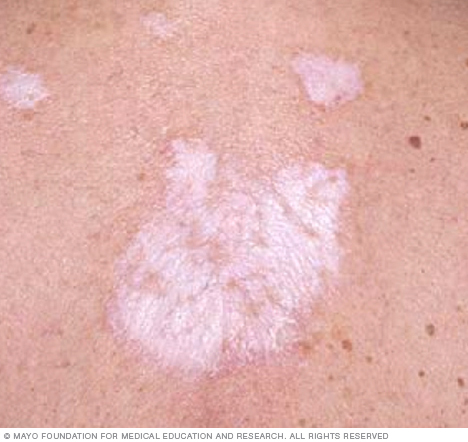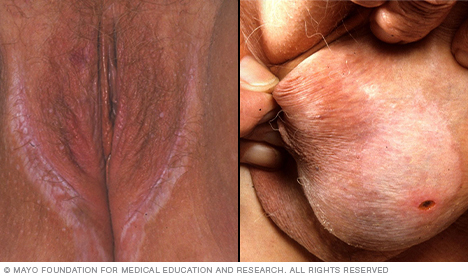Lichen sclerosus (LIE-kun skluh-ROW-sus) is an uncommon condition that creates patchy, white skin that appears thinner than normal. It usually affects the genital and anal areas.
Anyone can get lichen sclerosus but postmenopausal women are at higher risk.
Your doctor can suggest treatment with creams or ointments that help return a more normal appearance to your skin and decrease the tendency for scarring. The condition does tend to recur, so long-term follow-up care may be needed. Rarely, lichen sclerosus improves without treatment.
Symptoms
People with mild lichen sclerosus may have no signs or symptoms.
Signs and symptoms usually affect the skin of the genital and anal areas, but may also affect the skin of the upper body, upper arms and breasts. They may include:
- Redness
- Itching (pruritus), which can be severe
- Discomfort or pain
- Smooth white patches on your skin
- Blotchy, wrinkled patches
- Tearing or bleeding
- In severe cases, bleeding, blistering or ulcerated sores
- Painful sex
When to see a doctor
See your doctor if you have signs and symptoms common to lichen sclerosus.
If you've already been diagnosed with lichen sclerosus, see your doctor every six to 12 months to be checked for any skin changes or treatment side effects.

Lichen sclerosus is a rare skin condition characterized by white, blotchy patches of skin.

Lichen sclerosus may affect skin on any part of your body, but most often involves the skin of the vulva, foreskin of the penis or skin in the anal area.
Causes
The cause of lichen sclerosus is unknown. An overactive immune system or an imbalance of hormones may play a role. Previous skin damage at a particular site on your skin may increase the likelihood of lichen sclerosus at that location.
Lichen sclerosus isn't contagious and cannot be spread through sexual intercourse.
Lichen sclerosus often occurs in postmenopausal women, but also in men and children. In women, lichen sclerosus usually involves the vulva. In boys and men, uncircumcised males are most at risk, because the condition generally affects the foreskin.
In children, the signs and symptoms may improve at puberty, but they will still need monitoring for disease activity.
Risk factors
The risk of lichen sclerosus is higher for postmenopausal women, although it can occur in men and children. Men who are uncircumcised have a higher risk because the condition often affects the foreskin.
Complications
Complications of lichen sclerosus include painful sex, urinary retention, constipation and an inability to retract the foreskin. People with lichen sclerosus are also at an increased risk of squamous cell carcinoma of the affected area.
Diagnosis
Your doctor may diagnose lichen sclerosus based on:
- A physical examination
- Removal of a small piece of affected tissue (biopsy) for examination under a microscope
Your doctor may refer you to a specialist in skin conditions (dermatologist) or the female reproductive system.
Treatment
If you have lichen sclerosus on or around your genitals or anus, or have a more advanced case on other parts of your body, your doctor will recommend treatment. Treatment helps reduce itching, improve your skin's appearance and decrease further scarring. Recurrence is common. Rarely, lichen sclerosus gets better on its own.
Corticosteroids
Corticosteroid ointments or creams are commonly prescribed for lichen sclerosus. Initially, you'll generally have to use cortisone creams or ointments on the affected skin twice a day. After several weeks, your doctor will likely recommend that you only use these medications twice a week to prevent a recurrence.
Your doctor will monitor you for side effects associated with prolonged use of topical corticosteroids, such as further thinning of the skin.
Other treatment options
If corticosteroid treatment doesn't work or if months of corticosteroid therapy are needed, your doctor may prescribe an ointment such as tacrolimus (Protopic).
Removal of the foreskin (circumcision) in men is a common treatment in cases resistant to other therapies or more-advanced cases. Surgery in the genital or anal area generally isn't recommended for women with lichen sclerosus because the condition may just come back after surgery.
Ask your doctor how often you should return for follow-up exams. They are generally recommended every six to 12 months.
Lifestyle and home remedies
These self-care tips may help, whether you are undergoing treatment or not:
- Apply lubricant (petroleum jelly, A and D ointment, Aquaphor) to the affected area.
- Gently wash the affected area daily and pat dry. Avoid harsh soaps and bathing too much.
- Ease burning and pain with oatmeal solutions, sitz baths, ice packs or cool compresses.
- Take an oral antihistamine at bedtime to help control the itching as you try to sleep.
Preparing for an appointment
If you have signs and symptoms common to lichen sclerosus, make an appointment with your primary care doctor. Your doctor may refer you to a specialist in the diagnosis and treatment of skin conditions (dermatologist).
Here's some information to help you get ready for your appointment.
What you can do
Before your appointment make a list of:
- Your symptoms and how long you've had them.
- Your key medical information, such as other conditions with which you've been diagnosed and any prescription or over-the-counter medications you're using, including vitamins and supplements.
- Questions to ask your doctor.
Some basic questions to ask your doctor about possible lichen sclerosus include:
- What's the most likely cause of my symptoms?
- What treatment approach do you recommend, if any?
- If the first treatment doesn't work, what will you recommend next?
- How much do you expect my symptoms will improve with treatment — and how soon?
- Will I need treatment for this condition for the rest of my life?
- What self-care steps can I follow to ease my symptoms?
- What can I do to help prevent a recurrence?
What to expect from your doctor
Your doctor is likely to ask you a number of questions, such as:
- How severe is your discomfort?
- Have you noticed any bleeding?
- Do your symptoms include pain with urination or bowel movements?
- Do your symptoms include pain with sexual intercourse?
- Have you had any previous injuries to the affected area?
- What steps have you taken to treat this condition yourself?
- Have you had prescription treatments for this condition?
- Have you been diagnosed with any other medical conditions?
Copyright © 1998-2025 Mayo Foundation for Medical Education and Research (MFMER). All rights reserved.